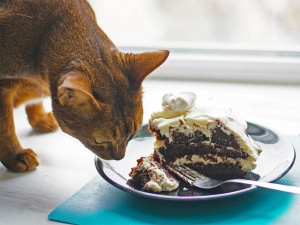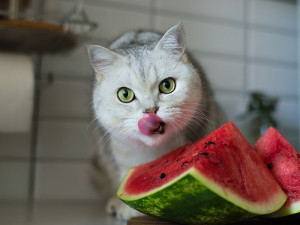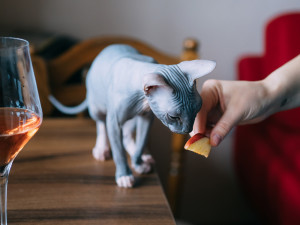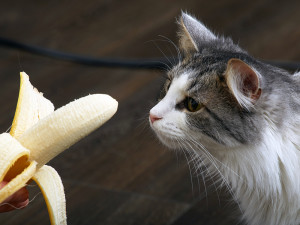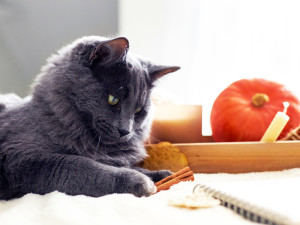There’s nothing cuter than watching your cat delicately lap up their favorite foods but as delicious as ice cream is for us, it is one food you should not share with your cat. Ice cream is a high-fat, high-sugar food that usually contains lots of dairy as well as other ingredients that may be unhealthy for cats.
Read on to learn more.
Nutrition facts about ice cream for cats
Ice cream recipes vary quite a bit, but they all tend to have certain components, including high-fat ingredients to provide that creamy texture and lots of sugar to give it that decadent sweet flavor. Traditional ice creams are usually made with a high-fat dairy base such as heavy cream or whole milk, which may also be combined with egg yolks sometimes.
Classic flavors contain extracts like vanilla or mint for flavoring, and of course, the possibilities are endless when it comes to mix-ins; chocolate, nuts, candy pieces, fruit, chunks of cake and even potato chips may be added to give each ice cream its own unique identity. And let’s face it, it’s delicious. Unfortunately for your cat, many of these dairy-rich, high-sugar, ingredients are unhealthy for them and others can be downright toxic.
How much do you spend on your pet per year?
Is ice cream good for cats?
Ice cream is not good for cats. It contains a number of ingredients that are unhealthy for cats as well as others that may actually be toxic. This includes:
Dairy: Cats are considered to be lactose-intolerant because they lack the enzyme, lactase, required to properly break down dairy and digest it. A tiny lick here and there wouldn’t cause too much harm, however, eating larger amounts of dairy will lead to digestive upset, including vomiting, gas, and/or diarrhea.
High in sugar: Cats are obligate carnivores, which means they evolved to eat whole prey that are typically high in protein and fat and low in sugar. They cannot metabolize sugar as well as omnivores like us, and as a result they are at increased risk for health problems like diabetes and weight gain if they consume a lot of sugar. Also, their taste buds lack receptors for sweet things, so they may not even truly appreciate the flavors of ice cream and are probably not missing out.
Toxins: Many ice cream flavors may also contain ingredients that pose a more serious health risk to cats if they are toxic. This includes chocolate, nuts, spices like cinnamon or nutmeg, and raisins. Any ice cream containing ingredients that are toxic to cats should be kept far out of reach.
Can cats eat dairy-free ice cream?
While dairy-free ice cream eliminates the risk of digestive upset from dairy, it still contains large quantities of sugar, high-fat ingredients, and potentially toxic mix-ins. Non-dairy ice cream still needs a high-fat ingredient to create its creamy, smooth, texture. Instead of high-fat dairy, manufacturers often use ingredients like cocoa butter, soy milk, nut milk, and/or coconut cream.
While these ingredients are not toxic to cats, they may develop digestive upset from the high-fat content if they are not accustomed to it. Cats tend to tolerate high fat in their diets better than humans and dogs, but the fat content in ice cream is likely to be even higher than what they are used to. Plus, this ice cream can still contain potentially toxic mix-ins and flavorings like chocolate, nuts, and more. These ice creams are still not a good option for cats as a result.
Is ice cream completely safe for cats?
Ice cream is not completely safe for cats. It contains a lot of ingredients that are unhealthy for them, as well as some that may be toxic. Additionally, there are many reasons to think cats may not even like ice cream, as hard as that may be for an ice cream aficionado to believe.
First, cats’ taste buds tend to be more selective for meaty flavors like protein and fat content and they do not appreciate sweet flavors. Second, many studies have shown that cats prefer to eat foods that are warm and moist, akin to eating fresh prey, yum. Therefore, ice cold sweet treats are just not what cats are craving and you don’t have to feel bad devouring your favorite ice cream in front of them.
The bottom line: Can cats eat human food?
There are many human foods that cats can eat; however, it is important to remember they are unique creatures with their own set of nutritional needs, taste preferences, and health considerations. Foods that are perfectly fine for us can be unappealing to cats, unhealthy for them, or even potentially toxic. And while your cat may be your soulmate, they can’t always be your dinner date.
For cats to live their best lives, they need to eat a complete and balanced cat food diet that is specifically formulated to meet their nutritional needs. Additionally, it is important to keep treats and table snacks to a minimum to prevent overfeeding them and putting them at risk for weight gain. Because indoor cats tend to be especially sedentary, overfeeding them just a little bit on a regular basis can really add up. In addition to providing them with a healthy diet in appropriate proportions, be sure to build in lots of opportunities for play and activity for your cat. This can include interactive toys, food puzzles, and climbing structures.
Other foods that are safe for cats
Shrimp can be a high-protein snack.
Strawberries and other fruits that are lower in sugar can be OK in moderation.
Plain, cooked tuna is also safe for the occasional snack.
Other foods that are dangerous for cats
Garlic and other plants in the Allium family are all toxic to cats.
Cheese is also not a good choice for cats.
Grapes are toxic and should be kept out of reach.
FAQs (People also ask):
How much ice cream can a cat eat?
Cats should not eat ice cream; it contains ingredients that are unhealthy for them as well as some that are potentially toxic.
Is it OK to give cats ice cream?
No, cats should not eat ice cream.
Why do cats like ice cream?
Cats may be attracted to the high fat flavors, however, they cannot taste sweet things as well as humans so they may not like it very much.
Can cats eat non-dairy ice cream?
No, non-dairy ice cream still contains too much sugar and potentially toxic ingredients.
References:
ASPCA Poison Control: When Pumpkin Spice Is Not so Niceopens in new tab
Food Republic: Everything You Need to Know About Non Dairy Ice Creamopens in new tab
Journal of Applied Animal Research: Taste Preferences and Diet Palatability in Cats opens in new tab
Scientific American: Why Cats Taste No Sweetsopens in new tab


